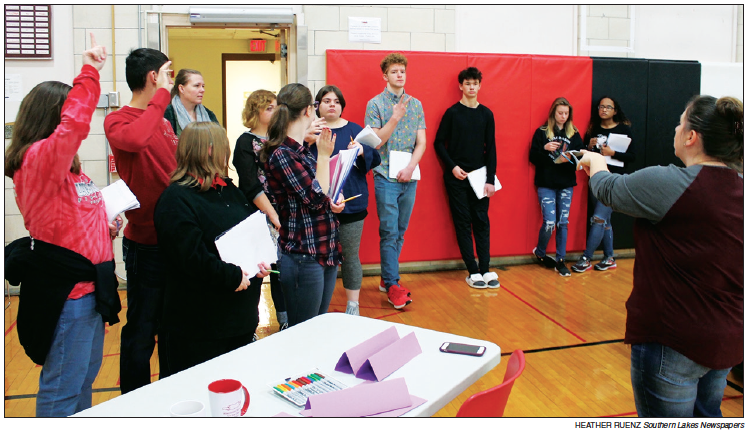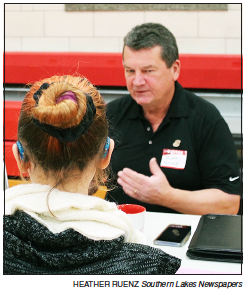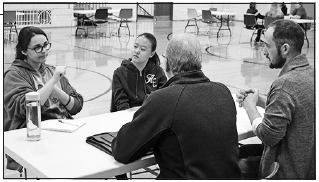Mutual understanding: Event connects business leaders with deaf students
By Heather Ruenz, Staff Writer, Southern Lakes Newspapers

Instructor Angela Lapworth (right) asks students how many tables they have visited during a mock interview event at Wisconsin School for the Deaf in Delavan. The event was intended to foster better understanding by the students and potential employers of people with disabilities.
A recent event at the Wisconsin School for the Deaf was held to open the lines of communication between the school’s students and area businesses. One of the school’s teachers said she has been taking small groups of students out to businesses but wanted to change things up this year.
“About two years ago I took high school students – split into five groups – and dropped them off around Delavan. They were to go into a business, ask two or three questions and walk out with a business card. We then came back to campus and discussed what they learned,” said Angela Lapworth, who serves as the Transition Coordinator at WSD.
During the process of teaching work-study for several years as well as touring businesses out in the community, Lapworth said she noticed a few things
“In work-study, I saw many examples of poor work habits such as coming back from lunch only to go to the bathroom for another 10 minutes, not emailing their boss about absences and so on,” she explained about the students.
But she said she also noticed things businesses could improve upon while on that side of the process.
“I noticed a slight apprehension of what it would look like should these companies hire a deaf person,” she explained, adding that variables may include if they would need to hire an interpreter for an entire shift or what other accommodations would need to be made, if any.
“Those things are what inspired this event. I believe this will help students to learn that I do not embellish when I say their behaviors are unacceptable and would not be tolerated,” Lapworth explained. “The event will also give companies the opportunity to meet students who are deaf and learn how they can work together.”
The event also featured Interpreter Training Program (ITP) students from Milwaukee who served as interpreters on behalf of both the deaf students and the company representatives.

Butch Nocek, a representative of Panera Bread, interviews Marinna Lampson, a student at Wisconsin School for the Deaf.
Learning more
The event was not actual interviews but a way for the students and companies to become more comfortable communicating.
Each table at the event had questions that could be used to help start the conversation, though both the business representatives as well as the students were encouraged to ask whatever came to mind during the process.
Questions – geared toward the company representatives on hand – included everything from the basics one might ask a potential employer, to those more specific to people with disabilities and members of the deaf community.
The questions included the following:
- What skills do you expect in your employees?
- What do you look for in a perspective interview candidate?
- What advice do you have for students who are applying for jobs?
- Are there any soft skills that students seem to be missing when they come out of school?
- What type of experience are you looking for in an employee?
- If you had a choice between hiring someone with experience or someone willing to learn, which candidate would you pick and why?
- What kind of resume format would you accept?
- For those of you who have hired individuals with disabilities, what are the advantages of doing so?
- Are there specific qualities that may be lacking in the general population that may be gained through hiring someone with a disability (specifically deafness)?
- How does hiring someone with a disability (specifically deafness) positively influence the rest of the staff?
- What are your concerns, as an employer, about hiring someone who is deaf?
- If I just came back from lunch and left again for a 10-minute bathroom break, would that be acceptable?
- If I were to be absent, how far in advance do I need to let you know I cannot come to work?
- How do you prefer employees handle conflicts whether with each other or towards their boss?
Feedback given
Lapworth said she followed up with both the students who participated as well as the company representatives and was excited to hear both sides thought the process was well worth their time.
“The businesses had nothing but positive comments. They claimed the students were well behaved, asked a lot of good questions and were really glad to have attended. They did not know what to expect but said this was a great experience for them,” she said.
The main suggestion from the company representatives is that they would have preferred more time with each group (there was a time limit set due to the number of students who wanted to participate.)
Lapworth said the interpreter students struggled with understanding WSD students, especially the more challenging ones.
“These interpreting students are first year so not much to be anticipated but more exposure under the watchful eye of our staff interpreters to intervene when needed,” she explained.

Davianna Daniels (left) and Shangyeng Xiong ask questions of a representative of Lake Lawn Resort, Delavan, while an interpreter (right) assists during a mock job interview event at Wisconsin School for the Deaf in Delavan.
HEATHER RUENZ, Southern Lakes Newspapers
She said the WSD students also need more assistance with self-advocacy skills.
“I saw some business people, when replying, turn around to look at the interpreter instead of the student,” Lapworth explained.
And the WSD students also thought the event was a good learning experience but wished there was more of a variety of businesses.
Lapworth said getting businesses to commit was a challenge and she tried several avenues to reach different businesses but is hopeful similar events can be held in the future and will bring in more companies.
“This was my first time doing this. Initially I went to a Chamber of Commerce meeting to pitch the idea. From there, I attended local business events soliciting my idea and collecting contacts. Finally, I drove around and went into local businesses,” she said.
She said they planned on 14 companies but only nine attended.
“When it was over, I asked them to talk about their experience so when we do it again, more companies will be willing to join in,” Lapworth said. “But overall, for the first time, it went well.”
For more information about the Wisconsin School for the Deaf, call 262-728-7118 (voice and text telephone options) or 262-725-0261 (videophone), or visit wesp-dhh.wi.gov/wsd.
